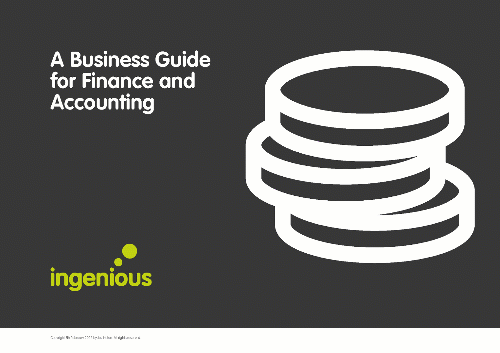
In today’s highly competitive business landscape, the role of fiscal management departments extends beyond traditional bookkeeping and number crunching.
These departments play a crucial role in driving new business acquisition. By leveraging financial data and insights, these functions can provide valuable strategic support to decision-makers, helping organisations identify growth opportunities, evaluate potential acquisitions, and execute successful deals.
This post will explore how finance and accounting can be powerful drivers of new business acquisition, offering practical examples and highlighting the benefits of a collaborative approach between these departments and the broader organisation.
This post is an exerpt taken from our Business Guide for Finance and Accounting companies. You can download your free copy of the guide by clicking the link below.

Identifying and Assessing Growth Opportunities
Finance and accounting professionals possess a wealth of financial data and insights that can be instrumental in identifying potential growth opportunities.
By analysing key financial metrics, such as revenue growth, profitability, and market trends, these professionals can help pinpoint industries, markets, or specific companies that present attractive prospects for new business acquisition.
Through thorough financial due diligence, they can assess the financial health and viability of potential targets, evaluating factors like cash flow, debt structure, and financial risk.
Maintaining a healthy cash flow enables businesses to allocate funds towards marketing initiatives, sales expansion, and other activities that drive customer acquisition and business growth.
Source: The Balance Small Business
Embrace Data and Act Accordingly
Do you have clean and accurate data? If you require reliable insights to source those growth opportunities now is the time to review your data systems and qualify the validity.
With correct governance data allows organisations to measure their value beyond purely financial goals. To make decisive proactive decisions there must be data integrity.
Having quantitative and qualitative data is the start point. Qualifying this with data integrity is the next step, yet not the most crucial. Many organisations struggle to extract and leverage data to their benefit. Without understanding what you should be looking for, data can just confuse decision making and complicate strategies.
Have a look at Databox’s comprehensive guide on how to maximise data trends and insights.

Evaluating Acquisition Targets
Financial Management departments are well-equipped to evaluate potential acquisition targets, ensuring that organisations make informed decisions.
They can conduct comprehensive financial analyses, including valuations, to determine the reasonable value of the target company. By examining financial statements, historical performance, and growth projections, finance professionals can assess the target’s alignment with the acquiring company’s strategic objectives.
Furthermore, accounting expertise enables the evaluation of potential synergies and integration challenges, providing valuable insights into the monetary impact of an acquisition.
Make Use of Technology
The advent of digital technology has revolutionised numerous aspects of our lives, including the finance industry. The sector is being compelled to optimise its systems to align with the changing preferences of individuals who are increasingly engaging with various industries through digital means.FinTech
Fintech (financial technology) refers to the use of innovative technology to provide financial services and solutions. It encompasses a wide range of applications, including mobile banking, online payments, digital lending, robo-advisory, and blockchain-based transactions, revolutionising the way individuals and businesses manage their finances.Artificial Intelligence
Whether we like it or not, AI is here to stay. Used correctly AI has the potential to be a game changer in the finance sector. Part of the digital transformation is to tap into available AI such as.- Improved Efficiency: AI can automate repetitive and time-consuming tasks, such as data entry, document processing, and risk assessment.
- Enhanced Decision-Making: AI algorithms can analyse vast amounts of financial data, identify patterns, and generate insights in real time. This helps financial institutions make data-driven decisions, detect anomalies, predict market trends, and assess investment risks more accurately.
- Fraud Detection: AI-powered systems can detect and prevent fraudulent activities by analysing transactional patterns, identifying suspicious behaviour, and flagging potentially fraudulent transactions. This strengthens security measures and protects both financial institutions and customers.
- Personalised Customer Experience: AI enables financial institutions to offer personalised recommendations, tailored products, and customised services based on individual customer preferences and behaviour.
- Risk Management: AI algorithms can assess and monitor risk factors in real time, helping financial institutions identify potential risks and take proactive measures to mitigate them. This includes credit risk assessment, market risk analysis, and compliance monitoring.
- Trading and Investment Strategies: AI-powered algorithms can analyse market data, news feeds, and historical patterns to generate trading signals and optimise investment strategies.

Financial Modelling and Deal Structuring
Finance and accounting play a pivotal role in developing financial models and structuring deals that optimise value for both the acquiring company and the target.
Through financial modelling, professionals can forecast the monetary impact of an acquisition, including revenue growth potential, cost savings, and return on investment. They can also assist in determining the most appropriate financing structure, evaluating factors such as debt capacity, equity dilution, and cash flow requirements.
By providing accurate financial projections and crafting optimal deal structures, finance and accounting departments help facilitate negotiations and support decision-making throughout the acquisition process.
Conclusion
Financial operations are not limited to their traditional roles but can actively drive new business acquisition. By leveraging their financial expertise, analytical skills, and strategic insights, these departments can identify growth opportunities, evaluate potential targets, and structure deals effectively.
Collaboration between finance, accounting, and other departments is crucial to maximise the chances of successful new business acquisition, fuelling organisational growth and competitive advantage.

